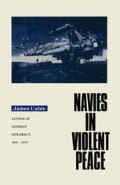Abstract
War at sea, as surveyed in the preceding chapters, seems unlikely to offer most navies much of a livelihood. If total, war would probably also be terminal. If limited, war may not involve navies at all and, if it does, their role may only be ancillary or even optional. Proxy war at sea is so far the merest hypothesis. Since 1945 only 25 of the world’s 105 navies have any shadow of a claim to have fought, even fleetingly, a foreign enemy in war at sea. These navies can nevertheless expect more employment, as can many of the remainder, in time of peace than in future war.
Prime Minister has decided that necessary number not (repeat not) of soldiers but of armed police from Singapore with good proportion of white officers should proceed at once in one of HM ships to Pulau Sambu and unless Indonesian reinforcements have already arrived and have restored the situation should land and ensure law and order. — fo telegram to singapore no. 77, 1 February 19521
We have a flash report from the Joint Reconnaissance Centre indicating a US electronic intelligence ship, the liberty, has been torpedoed in the Mediterranean. — walt rostow to President Johnson, 8 June 19672
The invasion of Grenada was a treacherous surprise attack … presented to the US people as a great victory for Reagan’s foreign policy against the socialist camp and the revolutionary movement. — castro, 26 October 19833
Access this chapter
Tax calculation will be finalised at checkout
Purchases are for personal use only
Preview
Unable to display preview. Download preview PDF.
Notes and References
Quoted in James Cable, ‘Flicker of An Imperial Flame’, International Relations, November 1983, p. 2440.
Quoted in Anthony Pearson, Conspiracy of Silence (London, Quartet Books, 1978), p. 57.
Quoted in Tony Thorndike, Grenada: Politics, Economics and Society (London, Frances Pinter, 1985), p. 171.
James Cable, Gunboat Diplomacy 1919–1979 (London, Macmillan, 1981), p. 39.
For a more extended discussion of coercive diplomacy, see James Cable, Diplomacy at Sea (London, Macmillan, 1985).
Ken Booth, Law, Force and Diplomacy at Sea (London, George Allen & Unwin, 1985), p. 147.
James M. Eames, Jr, Assault on the liberty (New York, Random House, 1979), Foreword.
Joseph C. Goulden, Truth is the First Casualty (Chicago, Rand, McNally, 1969), p. 143.
Richard K. Smith, ‘The Violation of the liberty’, United States Naval Institute Proceedings, June 1978.
Trevor Armbrister, A Matter of Accountability: The True Story of the pueblo Affair (London, Barrie & Jenkins, 1970), p. 139.
J.A.S. Grenville, Lord Salisbury and Foreign Policy (London, Athlone Press, 1970), p. 295.
Lord Franks, Falkland Islands Review (London, HMSO, 1983), pp. 11–12. Lord Shackleton, for whose father the ship was named, had just aroused Argentine anger by visiting the Falkland Islands to conduct an enquiry.
A book written with the help of the US Department of State argues that, once aboard guam, Scoon merely gave written confirmation of a plea for help made through an intermediary just before the landing began. Gregory Sandford and Richard Vigilante, Grenada: The Untold Story (Lanham, Madison Books, 1984), pp. 8–9.
Scott Davidson, Grenada (Aldershot, Gower, 1987), p. 32; The Times 7 November 1983.
Frank Uhlig, Jr, ‘Amphibious Aspects of the Grenada Episode’ in Peter M. Dunn and Bruce W. Watson (eds), American Intervention in Grenada (Boulder, Westview Press, 1985), pp. 89–97.
Secretary of State for Defence, The Falklands Campaign: The Lessons (London, HMSO, Cmnd 8758, 1982); and
Martin Middlebrook Task Force: The Falklands War 1982 (Harmondsworth, Penguin, revised ed. 1987, passim).
James Cable, The Royal Navy and the Siege of Bilbao (Cambridge University Press, 1979), passim.
James Adams, Secret Armies (London, Hutchinson, 1987), pp. 221–55.
Copyright information
© 1989 Sir James Cable
About this chapter
Cite this chapter
Cable, J. (1989). The Persistence of Gunboat Diplomacy. In: Navies in Violent Peace. Palgrave Macmillan, London. https://doi.org/10.1007/978-1-349-20074-0_4
Download citation
DOI: https://doi.org/10.1007/978-1-349-20074-0_4
Publisher Name: Palgrave Macmillan, London
Print ISBN: 978-1-349-20076-4
Online ISBN: 978-1-349-20074-0
eBook Packages: Palgrave Political & Intern. Studies CollectionPolitical Science and International Studies (R0)

